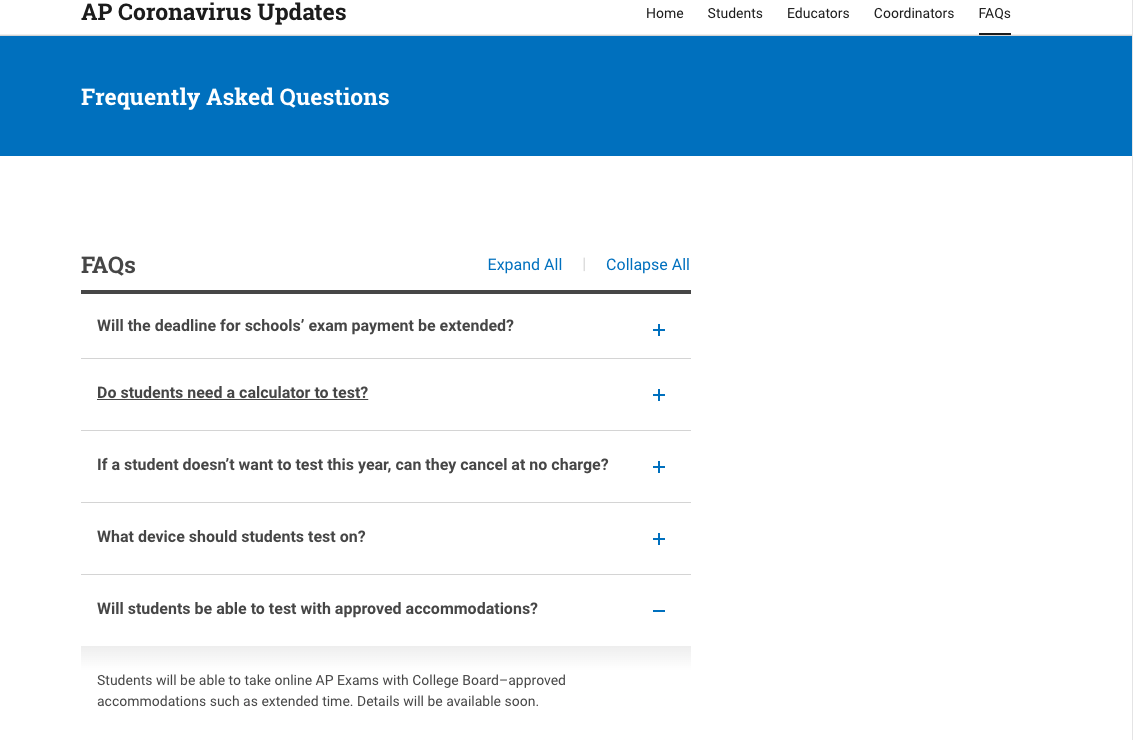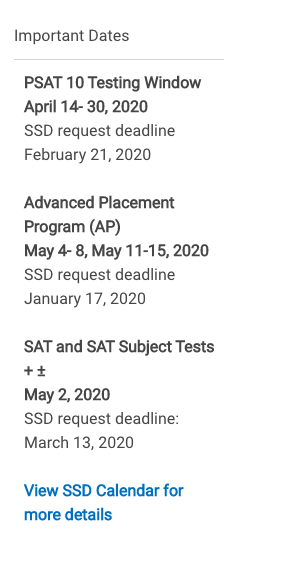Will there be Accommodations for Students during the AP Exam: Maybe, Maybe Not
The devil is in the details. Recently I missed a crucial detail in College Board's official responses regarding online AP exams. Each time College Board released a statement regarding accommodations, they include the phrase "approved accommodations." The official position is that “students will be able to take online AP Exams with College Board–approved accommodations such as extended time." I realized the phrase "approved accommodations" maybe significant in that it could be an indicator that College Board plans to honor only accommodation requests they approved before the Coronavirus (COVID-19) crisis. Those accommodations were approved before College Board announced that exams would occur online and not in-person with pencil/paper. It appears that College Board has no intention of honoring new accommodations requests or request to modify existing accommodations.
I cannot prove this is the case since College Board is currently evading most questions about accommodations with statements claiming information about accommodations is coming soon. The College Board has refused to answer most questions on this subject and continues to be vague when it finally does answer questions. The standard timeline for accommodations is seven weeks. College Board has not supplied any information on how to apply for accommodations due to the change format or modify accommodations. It has yet to announce an expedited review or appeal process.
Image of AP Coronavirus page taken on April 16, 2020. Frequently asked questions page (blue border). Accommodation description is dropped down and states, “Will students be able to test with approved accommodations?” Answer, “Students will be able to take online AP Exams with College Board–approved accommodations such as extended time. Details will be available soon.”
AP decided to move online this year and allow students impacted by COVD-19 (coronavirus) to take the exam and get credit. That announcement was hinted at in late March and made official on April 7th. On May 11th, AP exams will begin. It is now April 17th; there is no updated information on accommodations.
We are now 24 days out from the exam. The standard accommodation process takes seven weeks. College Board’s own website SEO description box at one point says, “start the process early.” Yet 24 days out from the online AP exam, students searching the FAQ for the exam discover that College Board has no detailed plan in place. In the webinar this week, College Board claimed information about accommodations will be supplied on April 20th, mere weeks before the exam. If the process typically takes seven weeks, it reasonable to conclude any student requesting new accommodations or modification to existing modification will be approved in time.
The only foreseeable way to get accommodations approved in that time is for AP to waive documentation requirements, as many accommodations require documentation from doctors/counselors/special education professionals/advocates, etc. College Board would also have to create expedited timelines for not only the accommodation request but also the appeal process.
As someone who has dealt with the College Board accommodations department, I can tell you that the decisions for accommodations have come back as late as the day before an exam when there was no time to appeal the decision. In those cases, my students had to either sit for the test without accommodations or wait until the next test. In this case, there is only one option for rescheduling, a June date. Trevor Packer and the official AP exam already announced that if students do not retake in June, no other option is available. Students who cannot sit for the exam by June will lose credit. This is why the timeline for details matters. Waiting to give out information about accommodations without automatic or expedited approval and appeals will force students’ hands if their accommodations are denied at the last minute. They will be forced to choose between taking the exam without accommodations or not taking the exam and losing credit.
I thought this decision by the College Board to delay information was a profound one until I realized that there was a real possibility that College Board never intended to allow new accommodation request or modifications to existing accommodations. The inclusion of the word “approved” is significant in the statement, “students will be able to take online AP Exams with College Board–approved accommodations such as extended time. More details will be available soon.” A statement presented on multiple AP exam coronavirus websites. It can be read to mean 1 of 2 things.
Of note: We cannot say for sure what interpretation is correct. Trevor Packer, College Board, and AP for Students all have systematically avoided questions by promising details “soon.” If you tweet the official accounts, as I have, they will avoid responding or respond with vague promises of detailed information. If you attempt to call as I have, you may be placed on hold until the system hangs up. There is no way to receive immediate answers as everyone kicks the can down the road on accommodations to “soon” despite the fact that the first test will occur 24 days out.
Image of the original dealdines for ap exam before the impact of Coronavirus (Covid 19). Image states important dates then list PSAT 10 Testing Window
April 14- 30, 2020
SSD request deadline
February 21, 2020
Advanced Placement Program (AP)
May 4- 8, May 11-15, 2020
SSD request deadline
January 17, 2020
SAT and SAT Subject Tests + ±
May 2, 2020
SSD request deadline:
March 13, 2020
The first interpretation is that “approved accommodations” means that only the accommodations that are commonly requested will be approved for this online exam. While College Board has only briefly mentioned extended time, it regularly provides a variety of accommodations; the most commonly requested accommodations are listed here. However, this interpretation of limiting accommodations excludes the possibility of a paper/pencil exam, a standard accommodation online exams. This approach would also prevent a student from requesting an accommodation not listed, which would be a violation of federal law. I don’t think College Board would violate the law in this way.
The second interpretation, the more menacing one that should send a shudder down the spine of anyone who believes in equity for students with accommodations, is that the word “approved” means only accommodations approved before the Coronavirus (COVID-19) crisis. These are accommodations that were submitted by the January 17th, 2020 deadline.
In this world “approved” carries the weight that students who did not apply for accommodations because the paper/pencil format did not require it or students who want to modify their accommodation due to the change in format may not be accommodated in time or at all for the online AP exam.
A change in the format of an exam can result in a student needing a change in accommodations. The accommodations you need for a paper/pencil exam and the accommodations you need for an online exam can be very different.
You cannot modify a test without putting accommodations in place and giving people details well-in-advance so they can be successful.
The lack of details impacts students with accommodations in the following way:
Documentation- most accommodations require documentation. This requires coordination with medical and sometimes school professionals. That process is long and laborious. It cannot happen in a 24 day span and is even more unlikely during the Coronavirus (COVID 19) crisis with stay at home orders in place. It also isn’t clear what documentation one would need for accommodations.
Testing- some accommodations or changes to accommodations requires students be tested to prove they have the disability requiring accommodation(s). To do this you must be examined by the professional that College Board deems appropriate. Appointments to these professionals are in short-supply and it can take weeks to get an appointment. This process i expensive and requires a lot of resources and time freedom. Resources and time freedom as well as the ability to see a medical professional face to face is nearly impossible during the Coronavirus (COVID-19) crisis.
Clarity- to apply for accommodations you need details. You need details of what accommodations are available and how they will work for this new format.
Access- In order to apply for accommodations, you may need access to practice materials so you can attempt the exam and then decide what accommodations are best for you.
Decisions- To have enough time to apply and appeal in time you must submit early. That is impossible for students with this time frame.
Without that in place, students will fail to get what they need. Which is intentionally or unintentionally by design in most cases. Accommodation processes that lack information and create short time lines tend to yield more rejections of accommodation requests. In that scenario the College Board and others can claim they tried to accommodate students while shifting the blame to students by saying the student did not give them what they need to approve the accommodation. Students then are left with a choice, take the exam without accommodations or opt out of participation.
There really is no meaningful way to fight the decision to reject accommodations as well. There is no accountability mechanism. Students could sue but that usually requires money, resources, a lawyer willing to take a case. Suing may result in an award of damages but it does not allow you to take the exam with accommodation. Students could file complaint under the American with Disabilities Act but that is usually ineffective. In the end, many students just accept that they will not be accommodated and move forward from there.
It is possible that I am wrong about and the lack of inclusion and erasure by College Board of students with accommodations is an oversight. I hope I am. But as of right now I have no confidence that College Board intends to accommodate any student with disability who did not apply for accommodations before the January 17th deadline. It is my belief that College Board will quickly reject and dismiss any new accommodation or modified accommodation request and rely on students to say silent to avoid scrutiny.
In my experience, the College Board has a history of systematically failing students with accommodations and the decisions made regarding students with accommodations during the online AP exam yet another egregious act.
It is time to hold College Board accountable and for those who stand with students who need accommodations to speak up.

